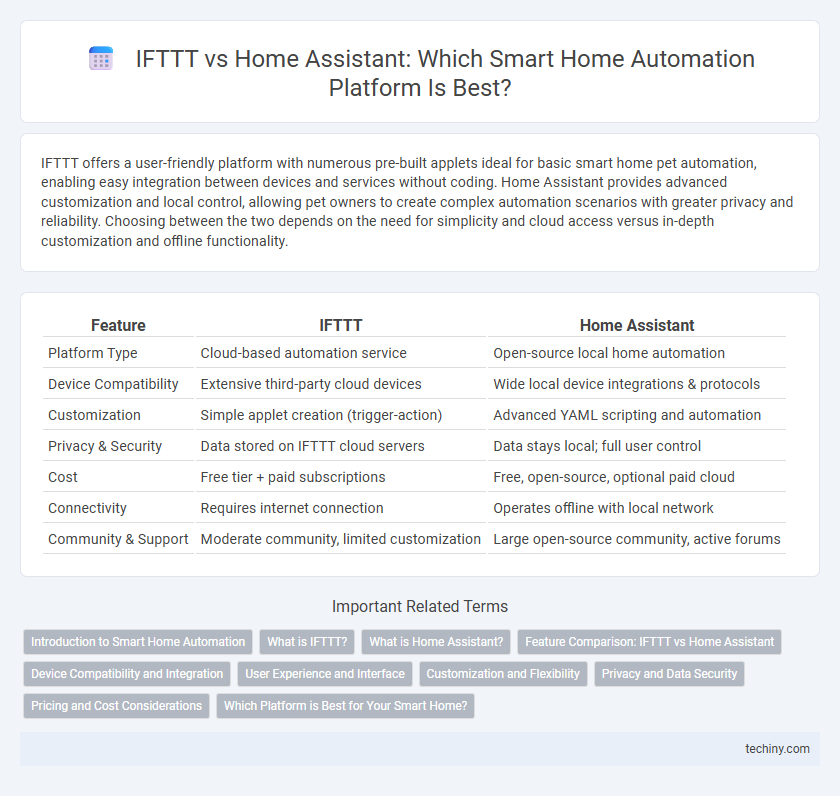IFTTT offers a user-friendly platform with numerous pre-built applets ideal for basic smart home pet automation, enabling easy integration between devices and services without coding. Home Assistant provides advanced customization and local control, allowing pet owners to create complex automation scenarios with greater privacy and reliability. Choosing between the two depends on the need for simplicity and cloud access versus in-depth customization and offline functionality.
Table of Comparison
| Feature | IFTTT | Home Assistant |
|---|---|---|
| Platform Type | Cloud-based automation service | Open-source local home automation |
| Device Compatibility | Extensive third-party cloud devices | Wide local device integrations & protocols |
| Customization | Simple applet creation (trigger-action) | Advanced YAML scripting and automation |
| Privacy & Security | Data stored on IFTTT cloud servers | Data stays local; full user control |
| Cost | Free tier + paid subscriptions | Free, open-source, optional paid cloud |
| Connectivity | Requires internet connection | Operates offline with local network |
| Community & Support | Moderate community, limited customization | Large open-source community, active forums |
Introduction to Smart Home Automation
Smart home automation transforms everyday living by connecting devices for seamless control and enhanced convenience. IFTTT offers user-friendly applets that integrate diverse brands and services, simplifying automation for beginners. Home Assistant provides a powerful, open-source platform with advanced customization and local control, ideal for users seeking comprehensive and privacy-focused smart home management.
What is IFTTT?
IFTTT (If This Then That) is a cloud-based automation platform that connects various smart home devices and services through simple conditional statements called applets. It enables users to create customized routines by linking triggers and actions across different brands and ecosystems without requiring coding skills. With support for hundreds of popular smart home products, IFTTT offers an accessible way to automate everyday tasks and enhance home connectivity.
What is Home Assistant?
Home Assistant is an open-source home automation platform that enables users to control and integrate smart devices locally without relying on cloud services. It supports a wide range of smart home products and protocols, offering advanced customization through YAML-based configuration and automation scripting. With its strong emphasis on privacy and local control, Home Assistant provides a powerful and flexible solution for creating a connected smart home ecosystem.
Feature Comparison: IFTTT vs Home Assistant
IFTTT offers extensive cloud-based automation with broad compatibility across thousands of smart devices and services, enabling simple applet creation for user-friendly automation. Home Assistant provides a more robust, local control platform with advanced customization, privacy benefits, and support for complex automations through scripting and integrations with numerous smart home protocols. While IFTTT excels in ease of use and cross-platform connectivity, Home Assistant stands out for its powerful features, local processing, and enhanced security in managing smart home ecosystems.
Device Compatibility and Integration
IFTTT supports a wide range of smart home devices through cloud-based applets, making it ideal for users seeking easy integration with popular brands like Philips Hue, Nest, and Amazon Alexa. Home Assistant offers local control with extensive compatibility for hundreds of smart home protocols and devices such as Zigbee, Z-Wave, and MQTT, providing deeper customization and privacy. Device compatibility in Home Assistant is generally broader and more flexible for advanced users seeking unified management.
User Experience and Interface
IFTTT offers a streamlined, user-friendly interface that simplifies automation creation with pre-built applets and a visual workflow designer, making it accessible for beginners. Home Assistant provides a highly customizable and local control interface that appeals to advanced users seeking granular control over smart home devices and complex automations. The choice between IFTTT and Home Assistant hinges on the balance between ease of use and depth of customization in smart home management.
Customization and Flexibility
Home Assistant offers superior customization and flexibility compared to IFTTT, allowing users to tailor smart home automation with advanced scripting, local control, and a vast library of integrations. IFTTT provides a simpler, cloud-based platform ideal for basic triggers and actions but lacks the granular control and offline functionality found in Home Assistant. This makes Home Assistant the preferred choice for tech-savvy users seeking a deeply personalized and robust smart home experience.
Privacy and Data Security
Home Assistant provides enhanced privacy and data security by running locally without relying on cloud services, ensuring that user data remains within the home network. IFTTT depends heavily on cloud infrastructure, potentially exposing sensitive smart home data to third-party servers and increasing the risk of data breaches. For users prioritizing control over personal information, Home Assistant offers a more secure and privacy-focused smart home automation platform.
Pricing and Cost Considerations
IFTTT offers a free plan with limited applets and a Pro subscription starting at $3.33 per month for advanced automations, making it cost-effective for casual users. Home Assistant is open-source and free to use, but may incur costs for a dedicated server or compatible smart devices, appealing to tech-savvy users seeking more customization. Evaluating the total cost requires considering subscription fees, hardware expenses, and the user's technical expertise for efficient smart home integration.
Which Platform is Best for Your Smart Home?
IFTTT offers simplicity with extensive applet support, ideal for beginners seeking easy automation across numerous devices and services, while Home Assistant provides advanced customization, local control, and robust privacy features favored by tech-savvy users aiming for deep integration and offline functionality. Evaluating your smart home demands involves considering factors like platform flexibility, device compatibility, and control preferences. For ultimate local control and privacy, Home Assistant is superior, whereas IFTTT excels in quick setups and broader cloud-based integrations.
IFTTT vs Home Assistant Infographic

 techiny.com
techiny.com